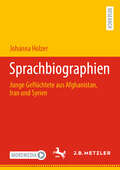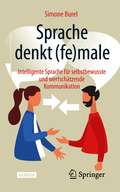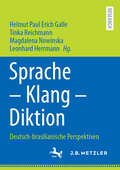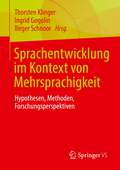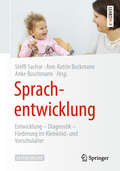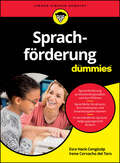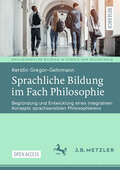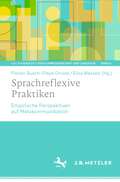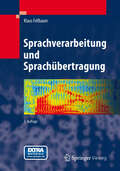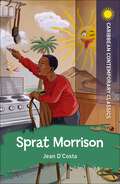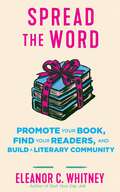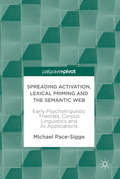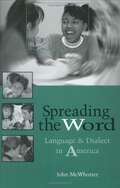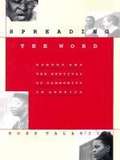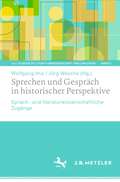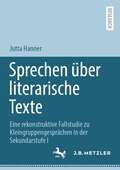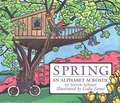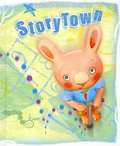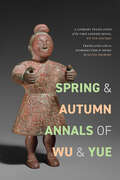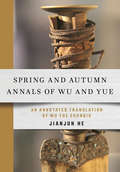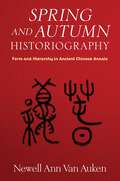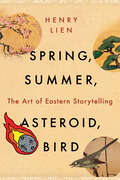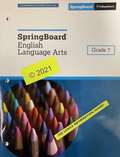- Table View
- List View
Sprachbiographien: Junge Geflüchtete aus Afghanistan, Iran und Syrien
by Johanna HolzerDie vorliegende Untersuchung widmet sich den Sprachbiographien junger Migrant:innen aus Afghanistan, Iran und Syrien, die in den Jahren 2015 und 2016 nach Deutschland geflüchtet sind. Im Mittelpunkt stehen dabei sowohl individuelle Einblicke in die Spracherwerbsprozesse als auch gruppenübergreifende Analysen im Rahmen der vergleichenden Sprachbiographieforschung. Zudem wird ein sprachbiographisches Analysemodell vorgestellt, das einen methodischen Ansatz zur Auswertung mündlicher Daten bietet.
Sprache denkt (fe)male: Intelligente Sprache für selbstbewusste und wertschätzende Kommunikation
by Simone BurelDieses Buch hinterfragt grundlegende Sprach- und damit Denkweisen, die unser gesamtes Leben prägen. Sprache ist das primäre Medium, über das wir die Welt und unser Wissen erfahren und vergegenständlichen. Anhand praktischer Beispiele aus über 100 Workshops und Coaching-Einheiten sowie persönlichen Erfahrungen von Dr. Simone Burel erhalten Sie Ratschläge, wie Sie mit unproduktiven Denk- und Sprachmustern umgehen können, um im Business Ihre Frau zu stehen. Zahlreiche Denk- und Schreibübungen regen zur Selbstreflexion an. In diesem Buch erfahren Sie, wie Sieeigene Denkfallen und Glaubenssätze überwinden,eigene sprachliche (und damit) kognitive Grenzen erweitern,Wörter mit negativem Impact vermeiden,eine höhere Sprachsicherheit und -qualität in der eigenen Kommunikation erlangen,Ihr Image durch einen sicheren Sprachauftritt verbessern,wertschätzend mit anderen kommunizieren.Das Buch ist eine Mixtur aus Erfahrungs- und Fachwissen, das Dr. Simone Burel aus zahlreichen Female-Business-Ratgebern und in Seminaren mit Teilnehmerinnen, Kundinnen sowie Studierende erarbeitet hat. Über zehn Jahre an Sprachforschung, Therapie, Coaching, Fachliteratur und permanenter sprachlicher Selbstarbeit tragen dazu bei. Aktuelle Forschung zum Thema Sprache & Kommunikation unterlegen die Prosa wissenschaftlich.
Sprache – Klang – Diktion: Deutsch-brasilianische Perspektiven
by Leonhard Herrmann Helmut Paul Erich Galle Tinka Reichmann Magdalena NowinskaDas interdisziplinäre Buchprojekt widmet sich den klanglichen Dimensionen von Sprache in Literaturwissenschaft, Linguistik und Translatologie.Die Beiträge beschäftigen sich dabei insbesondere mit Übergangsphänomenen zwischen Mündlichkeit und Schriftlichkeit sowie zwischen dem brasilianischen und dem deutschen Sprach- und Kulturraum.
Sprachentwicklung im Kontext von Mehrsprachigkeit: Hypothesen, Methoden, Forschungsperspektiven
by Birger Schnoor Ingrid Gogolin Thorsten KlingerDer Band fasst Ergebnisse einer Studie zusammen, in der die Entwicklung von sprachlichen Fähigkeiten bei Kindern und Jugendlichen untersucht wurde, die mehrsprachig leben. Mehrsprachigkeit ist dabei komponiert aus den Sprachen der Herkunft von Familien mit Migrationsgeschichte, dem Deutschen als umgebender Mehrheitssprache und schulischen Fremdsprachen. Im Fokus der Untersuchung steht die Entwicklung von Instrumenten, mit denen die Entwicklung sprachlicher Fähigkeiten in mehreren Sprachen über die Zeit überprüft werden kann. Vorgestellt werden die Ergebnisse zur Prüfung von verschiedenen Annäherungen an die Frage, wie produktive sprachliche Fähigkeiten (Schreiben) unter diesen Bedingungen getestet oder auf andere Weise valide nachvollzogen werden können. Im Zentrum stehen Ansätze, mit denen die Entwicklung in mehreren Sprachen über die Schulzeit hinweg vergleichend verfolgt werden kann.
Sprachentwicklung: Entwicklung – Diagnostik – Förderung im Kleinkind- und Vorschulalter
by Tamara LautenschlägerDieses Lehrbuch bietet einen kompakten Gesamtüberblick über das aktuelle Wissen zum Thema Sprachentwicklung, Sprachdiagnostik und Sprachförderung. Der Fokus liegt auf dem Kleinkind- und Vorschulalter. Die Themen des Buches umfassen die Grundlagen und spezifische Aspekte der Sprachentwicklung bei ein- und mehrsprachig aufwachsenden Kindern. Es werden Auffälligkeiten im Spracherwerb und deren Diagnostik, auch in Verbindung zu anderen Entwicklungsbereichen, sowie Möglichkeiten zur Förderung und Therapie sprachlicher Fähigkeiten in verschiedenen Kontexten dargestellt. Alle Kapitel sind einheitlich strukturiert, von erfahrenen Expert*innen aus Wissenschaft, Lehre und Praxis theoretisch fundiert und anschaulich verfasst. Sie enthalten neben aktuellen Studienergebnissen zu zentralen Inhalten auch konkrete Anwendungsmöglichkeiten und Fallbeispiele.
Sprachförderung für Dummies (Für Dummies)
by Esra Hack-Cengizalp Irene Corvacho del ToroSprachkompetenz richtig fördern Was ist eine Sprache überhaupt? Welche Funktionen hat sie und wie erwerben Kinder, Jugendliche und Erwachsene Sprache? Die Autorinnen Esra Hack-Cengizalp und Irene Corvacho del Toro erklären es Ihnen: Hier erfahren Sie verständlich, wie Sie professionell, wertschätzend und effektiv sprachfördern. Außerdem lernen Sie wirksame sprachdiagnostische Verfahren und ihre Anwendung in der täglichen Praxis sowie die konkrete Planung und Umsetzung sprachfördernder Maßnahmen in Kitas, Grundschulen und der Sekundarstufe kennen. Sie erfahren Was Sprachförderung ist und wie sie funktioniert. Was Sprachkompetenz bedeutet und wie sie gefördert werden kann. Wie Sie Sprachförderung in der Praxis umsetzen.
Sprachliche Bildung im Fach Philosophie: Begründung und Entwicklung eines integrativen Konzepts sprachsensiblen Philosophierens (Philosophische Bildung in Schule und Hochschule)
by Kerstin Gregor-GehrmannDieses Open-Access-Buch ist der Entwicklung eines systematischen Konzepts sprachsensiblen Philosophierens gewidmet. Seit einigen Jahren besteht Konsens, dass sprachliche Bildung Aufgabe eines jeden Unterrichtfaches ist. Innerhalb der Philosophiedidaktik wird dies bislang allerdings kaum berücksichtigt, obwohl – oder vielleicht gerade weil – das Arbeiten mit und an Sprache seit jeher zentral für die Disziplin der Philosophie ist. Die Autorin bestimmt zunächst sprachphilosophisch und bildungsethisch, wie ein sprachsensibler Philosophieunterricht angesichts der sprachlichen Anforderungen und Besonderheiten des Faches angelegt sein kann und sollte. Vor diesem Hintergrund wird die damit verbundene Forschungslücke geschlossen, methodische Möglichkeiten eines solchen kritisch sprachsensiblen Philosophierens auf Basis sprach- und fachwissenschaftlicher Vorarbeiten herzuleiten. In diesem Sinne werden sogenannte (hermeneutisch-)phänomenologische sowie (sprach-)analytische Ansätze didaktisch transformiert. Die gewonnenen methodischen Prinzipien werden anschließend auf das Philosophieren mit Gedankenexperimenten angewandt und in Gestalt einer exemplarischen, methodisch wie sprachbildend integrativen Reihe für die Unterrichtspraxis nutzbar gemacht.
Sprachreflexive Praktiken: Empirische Perspektiven auf Metakommunikation (LiLi: Studien zu Literaturwissenschaft und Linguistik #4)
by Florian Busch Pepe Droste Elisa WesselsMit sprachlicher Reflexivität ist die Möglichkeit von Sprache und Sprachgebrauch gemeint, sich auf sich selbst zu beziehen. Reflexivität ist in der Linguistik aus unterschiedlichen Perspektiven in den Blick genommen worden. Der Sammelband macht diese Partikularisierung insofern für ein integratives, multiperspektivisches Verständnis von Reflexivität fruchtbar, als aktuelle empirische Ansätze und Methoden der Untersuchung sprachreflexiver Praktiken zusammengeführt und kontrastiert werden. Die thematischen Schwerpunkte der Beiträge reichen von reflexiven Strukturen, über reflexiv indizierte kommunikative Aktivitäten bis hin zu solchen Sprach- und Kommunikationsideologien, die Reflexivität zugrunde liegen.
Sprachverarbeitung und Sprachübertragung
by Klaus FellbaumIn dem Standardwerk der Informationsverarbeitung werden nicht nur die elektroakustischen und nachrichtentechnischen Grundlagen dargestellt, auch die Sprache als menschliche Kommunikationsform wird aus linguistischer und physiologischer Perspektive beschrieben. Berücksichtigt wird dabei neben der Theorie stets die Anwendung - auf dem neuesten Stand der Technik. Die 2. Auflage bietet neue Abschnitte zu den Grundzügen der Signalanalyse und zu Sprachdialogsystemen. Audiobeispiele und multimediale Vortragselemente zum Download auf extras.springer.com.
Sprat Morrison (Caribbean Modern Classics)
by Jean D'CostaOver the course of one year, through Francis' eyes, we see the cycle of natural change and progression; the daily round of the market, showing the fruits of different seasons, the passage of dry season to rainy and back again to dry, the cane fires as the crop comes to an end, all symbolising the progression of the boy's year. And weaving in and amongst these mundane but intense experiences Francis feels his way to some understanding of adulthood.
Sprat Morrison (Caribbean Modern Classics)
by Jean D'CostaOver the course of one year, through Francis' eyes, we see the cycle of natural change and progression; the daily round of the market, showing the fruits of different seasons, the passage of dry season to rainy and back again to dry, the cane fires as the crop comes to an end, all symbolising the progression of the boy's year. And weaving in and amongst these mundane but intense experiences Francis feels his way to some understanding of adulthood.
Spread the Word: Promote Your Book, Find Your Readers, and Build a Literary Community
by Eleanor C. WhitneySo you've written a book—now what? Your next step is to find your readers and get that book into their hands.Eleanor Whitney, author of Quit Your Day Job, offers perspective, practical advice, and checklists for shepherding your book baby out into the wider world. Traditionally published, self-published, and hybrid authors alike will benefit from these tools and frameworks. No matter what kind of book you've written or where you are in the writing or publishing process, you can always build a community of readers. Whitney interviews other authors and publicists about what worked for them and what they learned the hard way and walks authors through creating and executing a plan to promote their book their way, with whatever resources and time they have available. She provides a timeline of promotional activities to consider before and after publication, and she also reminds us that publicity is a long game that you can begin well before your book is finished and continue well after its release. Ultimately, promoting your book is about connecting with a reader through ideas that inspire you both. And that is something we can all do.
Spreading Activation, Lexical Priming and the Semantic Web: Early Psycholinguistic Theories, Corpus Linguistics and AI Applications
by Michael Pace-SiggeThis book explores the interconnections between linguistics and Artificial Intelligence (AI) research, their mutually influential theories and developments, and the areas where these two groups can still learn from each other. It begins with a brief history of artificial intelligence theories focusing on figures including Alan Turing and M. Ross Quillian and the key concepts of priming, spread-activation and the semantic web. The author details the origins of the theory of lexical priming in early AI research and how it can be used to explain structures of language that corpus linguists have uncovered. He explores how the idea of mirroring the mind’s language processing has been adopted to create machines that can be taught to listen and understand human speech in a way that goes beyond a fixed set of commands. In doing so, he reveals how the latest research into the semantic web and Natural Language Processing has developed from its early roots. The book moves on to describe how the technology has evolved with the adoption of inference concepts, probabilistic grammar models, and deep neural networks in order to fine-tune the latest language-processing and translation tools. This engaging book offers thought-provoking insights to corpus linguists, computational linguists and those working in AI and NLP.
Spreading the Word: Language and Dialect in America
by John McWhorterThe idea that there is one "best" English is so intuitively plausible and so relentlessly inculcated in us that it is only natural to attempt to uphold this "Standard" among our students. Our error is in thinking that anything that deviates from this Standard is wrong. In Spreading the Word, linguist John McWhorter proves that these nonstandard dialects are not bastardizations of Standard English, but alternate variations upon the basic plan of English, of which the Standard is but one. <P><P> With a general focus on classroom applications, McWhorter makes accessible to teachers, teacher educators, and administrators basic language principles that are commonly accepted by linguists, but rarely disseminated to a general audience. Using data from several different languages, McWhorter shows that the speech differences we hear in America are qualitatively equivalent to those heard in other parts of the world where the same differences are not considered "bad language." He links his thesis not only to "prescriptive grammar," but to more immediate issues facing classroom teachers, such as Black English and code switching between Spanish and English. A complete chapter is dedicated to showing how mixture between languages is a worldwide and natural phenomenon, rather than a language-ravaging "accident."
Spreading the Word: Poetry and the Survival of Community in America
by Ross TalaricoIn 1985 poet Ross Talarico began a grassroots program in creative expression in Rochester, New York. As the program came together, so did the community--young and old, poor and privileged, even those who could not read or write but wanted to tell their stories. This book is a testimony to the poetry that experience produced. An exhilarating account of a successful experiment in promoting community self-expression, Spreading the Word interweaves the participants' stories with Talarico's own life, his struggle as a poet, and the drama of his workshops. The book will be both a resource and an inspiration for teachers of writing, writers, and those who simply wish to learn to write.Drawing on his workshops in Rochester, Talarico describes a unique approach for eliciting poetry from people of many ages and backgrounds--particularly underpriviledged urban kids and the elderly. The process--from dialogue to self-expression to publication to public event--illuminates the urgency and meaning of releasing the spirit captured in each man and woman and child's experience. "Some people say that Ross Talarico has done the impossible," the Today Show remarked of his success in Rochester; and with this book Talarico offers the same opportunity to others. Teachers, community leaders, parents, and children will be able to follow his practical, hands-on approach to encouraging self-expression in diverse, even unlikely, settings. They will see here how poetry is indeed relevant, ever more crucial to our identity as the culture evolves--how it is, finally, the place where the inarticulate can come to speak for themselves.
Sprechen und Gespräch in historischer Perspektive: Sprach- und literaturwissenschaftliche Zugänge (LiLi: Studien zu Literaturwissenschaft und Linguistik #7)
by Wolfgang Imo Jörg WescheInfolge der pragmatischen Wende in der Germanistik werden die Arbeitsweisen der linguistischen Dialog- und Interaktionsforschung zunehmend mit sprachhistorischen Fragestellungen verknüpft – empirische Erkenntnisse zur heutigen gesprochenen Sprache sollen helfen, Strukturen gesprochener Sprache früherer Epochen zu rekonstruieren. Die Beiträge des Bandes loten die Möglichkeiten und Grenzen interaktionaler, dialogischer bzw. nähesprachlicher Analysen historischer Texte aus. Die linguistischen Beiträge fokussieren Analysemethoden zur Erforschung von Nähesprachlichkeit, die literaturwissenschaftlichen Arbeiten rhetorische Techniken und die ästhetische Inszenierung von Mündlichkeit.
Sprechen über literarische Texte: Eine rekonstruktive Fallstudie zu Kleingruppengesprächen in der Sekundarstufe I
by Jutta HannerDem Sprechen über Literatur kommt im Deutschunterricht eine zentrale Bedeutung zu, wenn es um die Anbahnung von literarästhetischen Erfahrungen sowie um die verstehens- und sinnorientierte Auseinandersetzung mit literarischen Texten und damit um das gemeinsame Nachdenken über die Welt geht. Das gemeinsame Sprechen über Literatur dient darüber hinaus auch dem Erlernen literarischer und sprachlich-kommunikativer Fähigkeiten, die den Schüler*innen wiederum beim Lesen, Schreiben und Sprechen zur Verfügung stehen. Es ist daher eine Aufgabe des Deutschunterrichts, das Sprechen der Schüler*innen in Gesprächen über Literatur zu fördern. In der vorliegenden Studie wird das Sprechen über einen literarischen Text gegen Ende der Sekundarstufe I gesprächsanalytisch untersucht. Im Fokus steht dabei die Frage, welche Gesprächspraktiken die Schüler*innen beim Sprechen über Literatur in der Kleingruppe für die Sinnkonstruktion verwenden. Es werden dreizehn Praktiken rekonstruiert, anhand derer gezeigt wird, mit welchen sprachlich-kommunikativen Formen die Jugendlichen die Praktiken konkret vollziehen, wozu sie dies tun und welche Wirkung die Praktiken auf ihr Sprechen haben. Die Erforschung ist von Bedeutung, um Folgerungen für die Förderung im Deutschunterricht abzuleiten.
Spring
by Steven SchnurIn this companion book to "Autumn: An Alphabet Acrostic," the pleasures of spring, from April to Zenith, are captured in twenty-six short poems. New grass and daffodils, hopscotch and kite flying, kittens under the porch and baby birds under the eaves are the subjects of Steven Schnur's evocative verses and Leslie Evans's luminous linoleum-cut illustrations. When read vertically, each poem reveals a playful acrostic, making every handsomely designed page a double treat for the eye as well as a joyous tribute to the season.
Spring and Autumn Annals of Wu and Yue: A Literary Translation of the First Chinese Novel, Wu Yue chunqiu (SUNY series, Translating China)
by Olivia Anna MilburnA Tale of Two Kingdoms offers a highly readable translation of the earliest surviving novel written in the Chinese language, Wu Yue chunqiu (The Spring and Autumn Annals of the Kingdoms of Wu and Yue). Composed nearly two millennia ago and featuring some of the most famous characters in Chinese literature, this powerful saga of humiliation, violence, and revenge recounts the battles between the states of Wu and Yue during the Spring and Autumn period (770–481 BCE). In her detailed introduction and annotations, translator Olivia Milburn places the work in its historical and cultural context and explains its ongoing significance in the history of fiction writing in East Asia, making the case that this was, in fact, China's first novel. This approachable translation by one of the leading scholars in the field makes this key text available to specialist and nonspecialist readers alike.
Spring and Autumn Annals of Wu and Yue: An Annotated Translation of Wu Yue Chunqiu
by Jianjun HeSpring and Autumn Annals of Wu and Yue is the first complete English translation of Wu Yue Chunqiu, a chronicle of two neighboring states during China's Spring and Autumn period. This collection of political history, philosophy, and fictional accounts depicts the rise and fall of Wu and Yue and the rivalry between them, the inspiration for centuries of poetry, vernacular fiction, and drama.Wu Yue Chunqiu makes use of rich sources from the past, carefully adapting and developing them into complex stories. Historical figures are transformed into distinctive characters; simple records of events are fleshed out and made tangible. The result is a nuanced record that is both a compelling narrative and a valuable historical text. As one of the earliest examples of a regional history, Wu Yue Chunqiu is also an important source for the history of what is now Zhejiang and Jiangsu.In Spring and Autumn Annals of Wu and Yue, Jianjun He's engaging translation and extensive annotations make this significant historical and literary work accessible to an English-speaking audience for the first time.
Spring and Autumn Historiography: Form and Hierarchy in Ancient Chinese Annals (Tang Center Series in Early China)
by Newell Ann Van AukenThe Spring and Autumn is an annals text composed of brief records covering the period 722–479 BCE and written from the perspective of the ancient Chinese state of Lu. A long neglected part of the Chinese canon, it is traditionally ascribed to Confucius, who is said to have embedded his evaluations of events within the text. However, the formulaic and impersonal records do not resemble the repository of moral judgments that they are alleged to be.Driven by her discovery that the Spring and Autumn is governed by a system of rules, Newell Ann Van Auken argues that Lu record-keepers—not a later editor—produced the formally regular core of the text. She demonstrates that the Spring and Autumn employs formulaic phrasing and selective omission to encode the priorities of Lu and to communicate the relative importance of individuals, states, and events, and that many of its records are derived from diplomatic announcements received in Lu from regional states and the Zhou court. The Spring and Autumn is fundamentally a document designed to enhance the prestige of Lu, and its records reveal a profound concern with relative rank, displaying an idealized hierarchy that positions the state of Lu and its rulers at the apex. By establishing the Spring and Autumn as a genuine Bronze Age record, this book transforms our understanding of its significance and purpose, and also offers new approaches to the study of ancient annals in early China and elsewhere.
Spring, Summer, Asteroid, Bird: The Art of Eastern Storytelling
by Henry LienAn introduction to Eastern storytelling that opens readers’ minds to radically different ways of telling a satisfying story. Discussions in the West around diversity in the arts often focus on the identities of characters and creators. Speculative fiction author and writing instructor Henry Lien makes the pathbreaking argument that diversity is about more than just plopping different faces into stories that are 100 percent Western in spirit; it can—and should—encompass diverse structures, themes, and values. Using examples ranging from Parasite to The Thousand and One Nights to the Mario video game franchise, Lien shows how storytelling staples in the West, such as the three-act structure and themes of empowerment and change, are far from universal. He introduces the East Asian four-act structure (kishotenketsu), as well as circular and nested structures, and explains how Eastern value systems such as collectivism can dictate form. Spring, Summer, Asteroid, Bird is essential reading for any writer or reader who wants to broaden their understanding of how to tell a satisfying story.
SpringBoard English Language Arts 7th Grade
by Pat Bishop Susie Challancin Bryant Crisp Paul DeMaret [et al.]7th grade language arts textbook
SpringBoard English Language Arts grade 7
by English PanelSpringBoard English Language Arts, Grade 7, Consumable Student Edition
